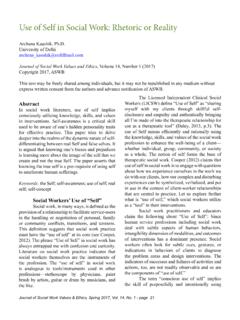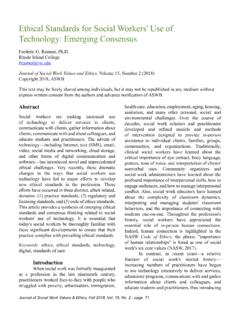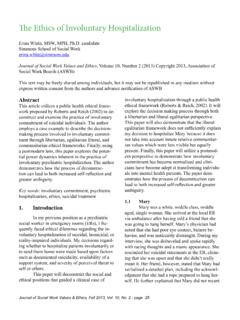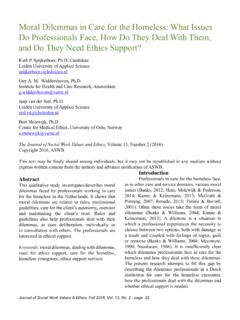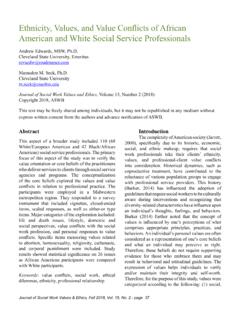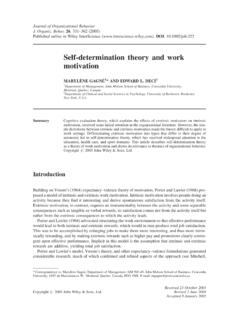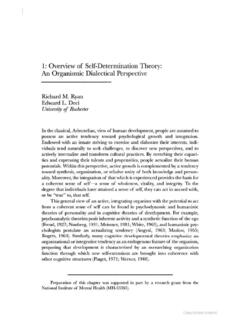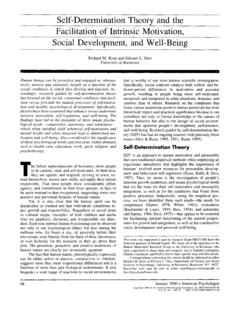Transcription of Thinking Critically About Self-Determination: A Literature ...
1 Journal of Social work Values & Ethics, Fall 2019, Vol. 16, No. 2 - page 9 Thinking Critically About self - determination : A Literature ReviewGinneh L. Akbar, DSWWest Chester Journal of Social work Values and Ethics, Volume 16, Number 2 (2019)Copyright 2019, ASWBThis text may be freely shared among individuals, but it may not be republished in any medium without express written consent from the authors and advance notification of , the concept that individuals are qualified to make their own decisions About their lives, is a central concept in the social work profession. It is described in the NASW Code of Ethics as one of a social worker s primary ethical responsibilities, and it provides a framework for practitioners working with the many populations that social workers serve.
2 Despite the NASW s professional mandate, self - determination has been the subject of decades of discipline-wide debate. Proponents argue that self - determination is empowering and acknowledges that clients are the best resource on their own needs. Critics argue that one can never fully be self -determined and that social workers face an impossible dilemma: they must promote client self - determination while upholding societal and agency conventions, oftentimes in contradiction with each : self - determination , client self - determination , social work ethics, ethical dilemmas, social work valuesThe Concept of self -DeterminationSelf- determination , an ideal based on the freedom to think, choose and act on one s own path in life, is considered to be a core principle and among the top of the hierarchy in importance in many Western nations (Dolgoff, Loewenberg, & Harrington, 2004; Freedberg, 1989; Furlong, 2003; Weick & Pope, 1988).
3 self - determination is based upon the principle that the individual is the best judge of his or her own interests and that each person has the right to make his or her own decisions (Furlong, 2003; Karlsson & Nilholm, 2006). Although self - determination is not explicitly mentioned in the United States Constitution, it is a right that is considered protected by the 9th and 14th amendments and is based on the broader values of liberty, justice, equality and freedom (Dolgoff et al., 2004; Staller & Kirk, 1997). An individual s self - determination provides him or her with a sense of purpose and destiny and can encourage positive outcomes in life.
4 Despite it being a seemingly positive concept, self - determination has been the subject of debate and controversy among social workers (Furlong, 2003; Perlman, 1965). As Tower (1994) states, the social work profession has held self - determination among its highest values, one that is implied in all of the other values in the Code of Ethics (Biestek & Gehrig, 1978). Yet, others dismiss it as a catchphrase, professional jargon, and a practice principle that is impossible to implement (Ackerman, 2006, Dolgoff et al., 2004; Weick & Pope, 1988). Even more harshly, Biestek & Gehrig (1978) label it as a term that could be seen as manipulative or following review highlights the evolution of the concept of self - determination in the social work Literature , from the early stages of social work through contemporary practice.
5 The review examines self - determination by decade, noting the Journal of Social work Values & Ethics, Fall 2019, Vol. 16, No. 2 - page 10 Thinking Critically About self - determination : A Literature Reviewsocial climate, the evolution of the profession, and how those factors impacted how social workers both define self - determination and promote it in practice. Overall, the Literature reveals that the dichotomy between social work and promoting client self - determination is not newly emerging, and that social workers have struggled with similar conflicts since the origin of the profession. The decades examined are characterized by conflicts in self - determination unique to those time periods, which were influenced by the changing role of workers, as well as social and political factors of a particular Historical Development of self -DeterminationThe earliest known definition of self - determination is found in Webster s dictionary in 1683, which defined the term as determination of one s mind or will by itself toward an object or the action of a people in deciding its own form of government (Wehmeyer, 2004, p.)
6 340). In the early 18th and 19th centuries self - determination was primarily a philosophical principle derived from concepts surrounding man s free will and determinism to choose his life s path without external compulsion (Wehmeyer, 2004). In the early 1900s, the advent of evolutionary theory led to more biologically driven models to explain determinism in human behavior (Wehmeyer, 2004). The philosophical view of determinism, which posits that human behaviors and actions are effects of preceding causes, can be considered the antecedent of modern definitions of self - determination , but the terms must be distinguished.
7 self - determination was not seen as an inexorable human function, rather a human right, basic to all individuals, having the ability to reason, the capacity for growth and the choice of one s own actions (Freedberg, 1989; Weick & Pope, 1988).Social work began with the charity organization and settlement movements of the 1890s, with middle- and upper-class families distributing financial, intellectual and moral aid to their lower socio-economic status neighbors (Courtney & Specht, 1994). At the turn of the century, social work , then termed social works, focused on working with individuals and communities (Courtney & Specht, 1994).
8 During the early 20th century, from 1901-1910, the United States experienced large-scale immigration from Southern Europe, which inevitably influenced the country s population, federal policies, and thus social work practice. The communities that social workers served grew larger and more diverse and had more diverse needs. Social workers, with a mission to work with the country s most disadvantaged, saw an increase in agency caseloads due to the increased immigration (Biestek & Gehrig, 1978; Courtney & Specht, 1994).From 1910-1920, social work became more recognized as a legitimate profession (Lubove, 1983).
9 During this time many social work organizations were established, namely, the American Association of Medical Social Workers, the American Association of School Social Workers, and the American Association of Psychiatric Social Workers. Client self - determination was challenged as social work continued to define the role of the profession and establish the limits of case worker purpose and function. The expectations of clients varied as workers struggled with language barriers with their new clientele, and made their own interpretations of their clients needs, generally providing basics such as food and shelter (Biestek & Gehrig, 1978).
10 The social work Literature noted the importance of the concept of client freedom, but found difficulties in casework practice applications particularly as social work became more influenced by the profession of psychiatry, which had a more medically oriented focus (Courtney & Specht, 1994). This theory versus practice dichotomy in defining and supporting self - determination is a recurring theme throughout the historical professional Literature and social work practice. Even today, social workers struggle with how to integrate social work practice guidelines, which are based on theory and ethics, with work in the field.
